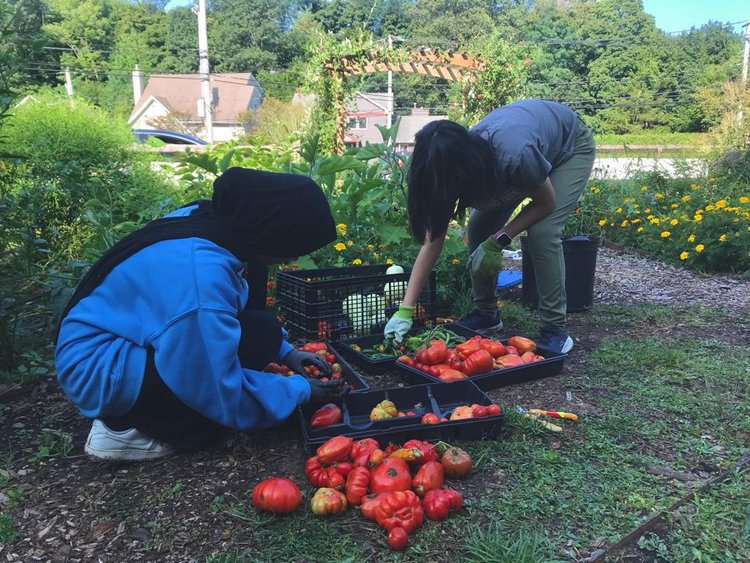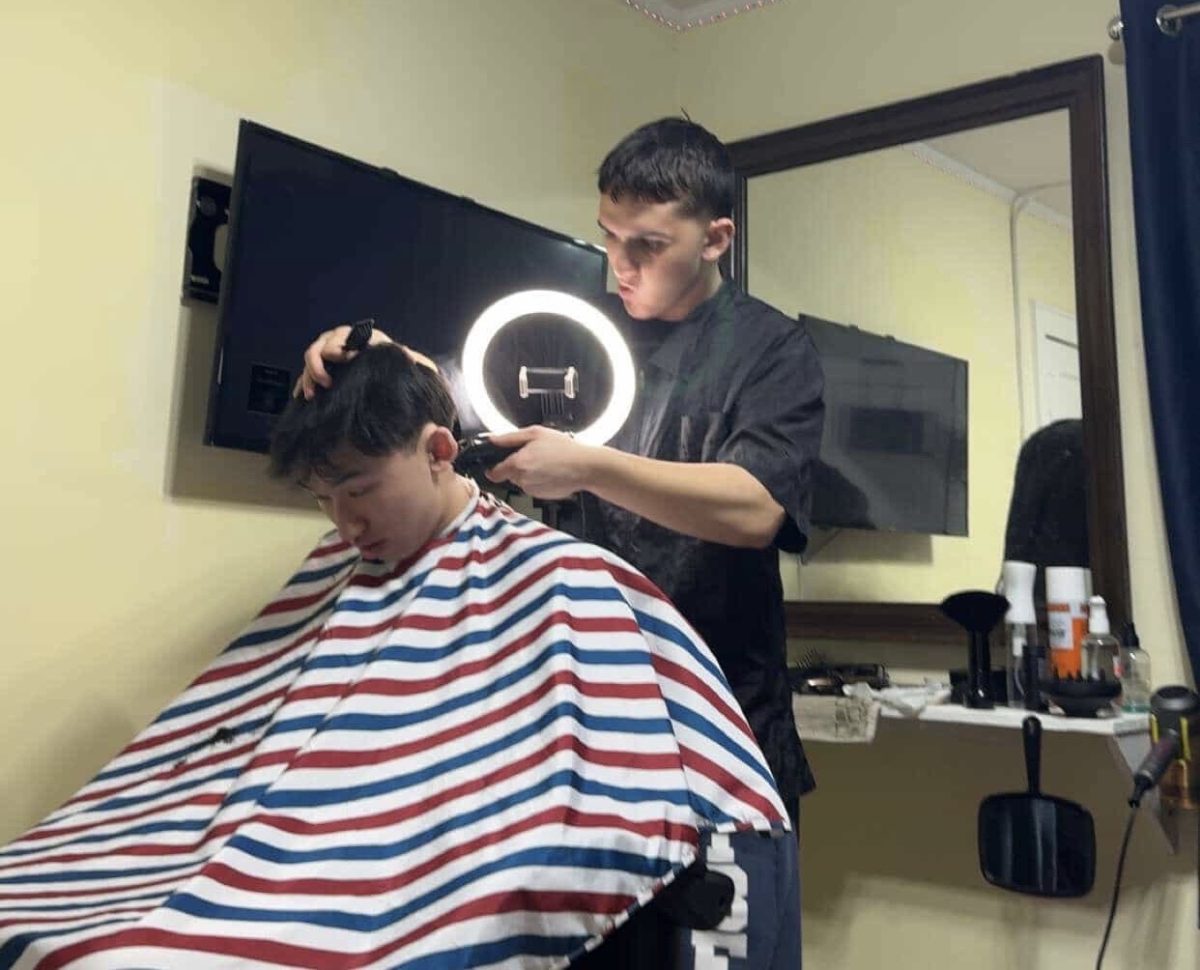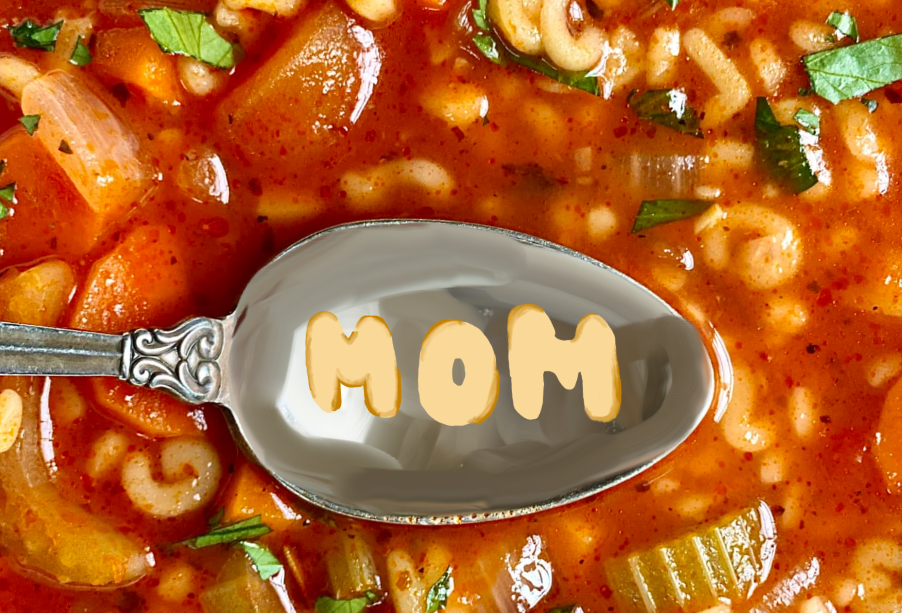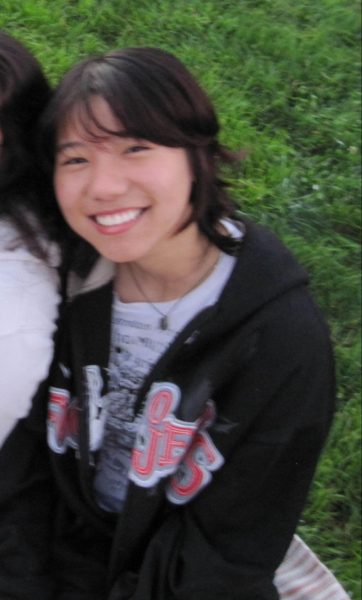From its apex in the sky, the sun’s light streams through the treeline and dances on a mulch-covered path. Billions of pollen particles stirred up by honey bees glow white amidst the rays and tickle the noses of the student volunteers scattered around the garden. With only their heads poking out of the greenery, they kneel alongside soil beds bejeweled with ruby tomatoes, citrine squash, and emerald beans.
This location is one of the many gardens and preserves across the Town of North Hempstead that the Cow Neck Chapter of ReWild Long Island holds its annual summer program in. ReWild, meaning the action of restoring an area of land to its natural state, has been dedicated to expanding its efforts toward sustainability and justice through youth involvement since 2020.
“[The ReWild Summer Program] is a hands-on program that targets high schoolers who are passionate about climate resilience, food insecurity, and community issues as a whole,” says Raju Rajan, the founder and board president of ReWild. “The goal here is to take young people who already have a concern for the environment and turn them into volunteers, and then, for those who want to go further, into activists.
From July to October 2023, forty-five students from various Nassau County schools stepped up as mentors/organizers, interns, or volunteers, of which sixteen attend South High. They were tasked with using SignUpGenius, a self-scheduling site, to select where and when they were available to undertake a plethora of tasks geared towards reestablishing mutually beneficial human-environment relationships.
Rajan explains, “It mainly consists of projects that work on a variety of things—planting native plants, growing organic food, and collecting compost are some examples of what we do. This year, we added oyster gardening at the North Hempstead Beach Park.”
The addition of the 60-acre beachfront exemplifies the diverse range of locations that ReWild offers. Always with the intention of allowing as much exploration of the natural world as possible, students are encouraged to uproot invasive weeds in the sprawling fields of Manhasset’s Greentree Foundation, get dirt etched in their nails at Port Washington’s Plant-A-Row garden, and observe various bird species in Plandome’s Science Museum of Long Island. Other activities include cleaning up nearby beaches, recycling used plant pots, going on nature walks, and conducting weekly Zoom sessions.
To Rajan, “learning by doing” is the key principle of the program: “It’s important because we’re not only successful in making a community impact, but because it has real, tangible results right now. Whether we’re measuring how many invasive [species] we’ve eradicated from Leeds Pond or how much food we’ve grown that was donated to food pantries, it gives back to the community and environment.”
“On the other hand,” he continues, “From the students’ perspectives, they really learn for the first time that they can actually help our ecosystem. Anyone who is interested in any subject can reach out to our website or join the summer program.”
Megan Chan is one of South High’s juniors who joined ReWild through this avenue. “I heard a lot of counselors talking about it, and the website was really clear since it already had the schedule up. Then there was an interview, which was pretty straightforward. Everything was very manageable,” she says.
She soon began her sixty hours of volunteer work after being accepted as an intern in early June. “I didn’t know that much [about] gardening or composting at first,” Megan says, “[which] might have seemed intimidating, but ReWild taught us along the way and let us know that it was OK if mistakes were made. There was a lot more hand-holding with the mentors and organizers, but I learned a lot of skills that I could apply elsewhere.”
A typical day for Chan would be verifying her attendance on SignUpGenius, and then arriving at the site to pledge about two hours towards the goals of that day. More often than not, she would find herself and her peers elbows deep in a bush overtaken by ReWild’s infamously known porcelain berry vines.
“It was a lot of work, but it was nice having other people my age there. At the beginning, it was kind of awkward because a lot of [the other students from South High] were from different grades, but we ended up having a lot to talk about.” Megan laughs and shakes her head at a memory of dewy grass and crisp air. “I remember that I recently went with Lucas [Ma, a freshman from Herricks High School] and Zoey [Yang, a senior from South High School] to the [Unitarian Universalist Congregation of Shelter Rock Preserve]. We were transplanting black huckleberries and putting earthworms into the pots that we were transporting. It was really funny because it was just really wacky stuff! There were definitely a lot of jokes that day.”
Similar to Chan, Cynthia Zhang also joined the ReWild Summer Program, albeit in 2022. A sophomore and former ReWild intern, she was reinvited as one of the mentors/organizers for the 2023 program. “We plan everything that goes on behind the scenes, like the scheduling, the publicity, and the candidate interviews,” Zhang says. “I was [also] the mentor at the TONH Beach Park, where we took care of the oysters and helped the Coalition of North Hempstead Harbor track their progress.”
Zhang believes that her time as an intern familiarized her with the responsibility needed to manage the next generation of volunteers. Alongside the adult mentors, such as Rajan, it gave her confidence in collaborating with many different voices. “There’s a lot of teamwork and thought that goes into the process. All of the adults made a really welcoming atmosphere where we weren’t afraid to ask questions, and they were always willing to explain things very thoroughly for us.”
When asked about her experience working with a dozen other volunteers at the Beach Park, Zhang replies with a shy smile: “It was cool to see other people with the same passions as me. I felt that a lot of people joined the program just to try something new, but you could see how they really started enjoying the activities. As students, we often focus on a lot of academic extracurriculars, but ReWild provides the option to work in nature over the summer.”
Rajan, believing nothing is more important than engaging the youth, also smiles upon hearing how ReWild gathered teens together. “I think young people care a lot about the environment,” he replies reverently. “The students from Great Neck South High School were phenomenal. Great Neck South, for me, embodies what I think a forward-looking school should be. Whether it’s through students that came to ReWild or within its environmental clubs, they’re a great example of a culture of caring and activism.”
“And it’s not like they’re ignoring their studies or future plans!” he laughs. “They’re doing it in a holistic way that I think is very healthy. It’s good for their careers. It’s good for their mental well-being. It’s good for their communities. We never have a shortage of young people who care.”
Although the Summer Program commenced its closing ceremony on October 7, parents and students alike continue to express interest in connecting with ReWild’s organizing team. It is undeniably exciting for Rajan, who receives emails as the board president, and Zhang, who receives messages as the co-chair of ReWild’s Social Media Team, that the running river tying community action to our local ecosystems never ceases to flow.
“Teens are the future,” Zhang says. “I feel like most people are aware of climate change, but not a lot of people know about the biodiversity crisis. ReWild provides a place for students to be outdoors and pursue their passions at the same time. It’s important for our generation to continue the fight.”







